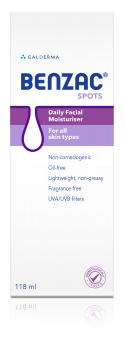10 Facts You Need to Know About Acne

Let’s face it, we love our friends and family (well at least most of the time), but how many times has one of them uttered something along the lines of…
• Your skin looks bad today…
• Are you eating too much junk food?
• Your make-up is clogging your pores…
• Your skin looks a little oily…
• Your skin looks a little dry…
• Are you washing your face?
• You need to stop picking your pimples!
Ugh! With so much finger pointing going on, it’s no wonder that every time a new pimple pops up, we instantly feel like it’s our fault. Next time a breakout occurs, don’t beat yourself up over it because there are a few things you need to know about acne.
1. Stop blaming yourself!
Acne is not your fault. We repeat: Acne is not your fault!
Unfortunately, when it comes down to it, nine times out of ten our acne is not a direct result of something that we’re “doing”. Acne is an inflammatory disease that almost everyone experiences at some point in their life, especially if you’re going through or have just gone through puberty.
2. You are not alone
When you’re scrolling through Instagram, it might feel like you’re the only one out there with problem skin, but don’t let those filters fool you. Acne is an incredibly common problem and more than 85% of teenagers will experience acne in their lives.1 Even Lorde, Lili Reinhart and Jade Tuncdoruk have spoken out about their skin issues on social media. So next time you look in the mirror, know that you are not alone.
3. Bacteria causes acne
• Your hormones ramp up your oil production
Hair follicles have small glands (called sebaceous glands) that produce a natural oil (called sebum). If these glands are sensitive, then your hormones (known as androgens) can cause us to produce excess sebum (aka extra oil).
• Your skin cells die
When your skin cells around the follicle die (yep, they don’t live forever) and mix with the excess oil, this mixture clumps together and get trapped inside your pores, starting to clog.
• Enter bacteria
Once the oil and dead skin cells accumulate in your pores, this creates the perfect environment for particular bacteria to thrive. The acne bacteria (Propionibacterium or P. Acnes, for those who love science) starts to thrive and will multiply so much that the pore will swell, become red and in some instances, pus (which is actually white blood cells) will accumulate and spill out of the skin.
4. Not all pimples are equal
When a pimple or breakout occurs, it’s important to know what type of acne you’re dealing with. Here’s a breakdown of the different types of acne and the common pimples that occur.
• Mild acne
Mild acne is when there is very little inflammation of the skin, but whiteheads (closed clogged pores) and/or blackheads (open clogged pores that are easily visible) are present.
• Moderate acne
Your acne will be defined as moderate if you have whiteheads, blackheads and inflamed red pimples (known as papules) or raised red spots (known as pustules).
• Severe acne
Severe acne is a mix of any of the above, but you’ll also have hidden cystic acne that live under the skin. These hidden pimples can be large, painful and cause severe redness to the skin’s surface.
5. All acne is treatable
The good news is that acne is treatable. For both mild and moderate acne the most effective treatment is implementing a therapeutic skincare routine that includes cleansing, treating and moisturizing. It’s imperative that your treatment products contain key acne-fighting ingredients, such as benzoyl peroxide. To put it bluntly, this ingredient truly kicks butt when it comes to acne.
When using a treatment gel such as Benzac’s AC treatment gel, the benzoyl peroxide will work hard to penetrate into the pores and kill the bacteria hiding underneath and prevent new pimples from forming. It also helps to slough away the dead skin cells on top, helping to prevent clogged pores.
6. But not all acne treatments are equal
If your acne is severe, over-the-counter acne products may not be strong enough to help clear your skin. If this is the case, it’s always best to speak to your GP or a dermatologist to explore other treatment options.
7. Some acne treatments can dry out the skin before it gets better
When putting benzoyl peroxide to work, there is a chance that your skin will have an adjustment period. You may experience some irritation (dryness and redness), but don’t worry, if that’s the case you can try using your acne treatment every other day or switch to a lower concentration and build up from there.
Another important step for combatting any dryness is to ensure that you moisturise after applying the treatment – both morning and night. Always choose a moisturizer that won’t clog your pores, such as Benzac Daily Facial Moisturiser.
8. Popping pimples will make it worse
There’s nothing more satisfying than popping a fresh pimple. Don’t believe us? There’s a reason why Dr. Pimple Popper has more than five million subscribers on her YouTube channel. But before you go ahead and start to get handsy with your face, stop! Popping pimples can do more harm than good. When you pop a pimple, you can easily spread bacteria to other parts to the face so let your acne-fighting skincare products do the work instead. But if your pimples are really out of hand, it’s always best to see a dermatologist and get them to do all the dirty work.
9. SPF is important
We all know what happens when you spend too much time in the sun without sunscreen on, but we’ve got one more reason for you to be sun-smart. When using a product that contains benzoyl peroxide, your skin will become more sensitive and you’ll be more susceptible to getting sunburnt. Being sunburnt sucks for many reasons, but if you have acne it can cause scarring, and even drier, flakier skin. In the morning, after cleansing, treating, and moisturising, make sure you apply a good, non-comedogenic sunscreen that will help prevent sunburn without clogging your pores.
10. Acne doesn’t go away overnight
Acne doesn’t appear overnight, in fact it’s a slow process that begins several weeks underneath the skin. Because of this, it definitely won’t go away overnight. Using a treatment product with benzoyl peroxide is super effective for getting rid of your unwanted pimples, but you need to be patient and you need to be consistent in your application. It will take a few weeks for you to see results. This can be frustrating, but commit to really kick those pimples to the curb.
As you can see, you don’t get acne because of “what you’re doing”. Acne is an all-too-common disease that nearly everyone will experience in their life. So next time a breakout occurs, don’t beat yourself up! Know the facts and implement a skincare routine to treat and prevent.
(1) Ayer J, Burrows N. Acne: more than skin deep. Postgraduate medical journal. 2006 Aug 1;82(970):500-6






